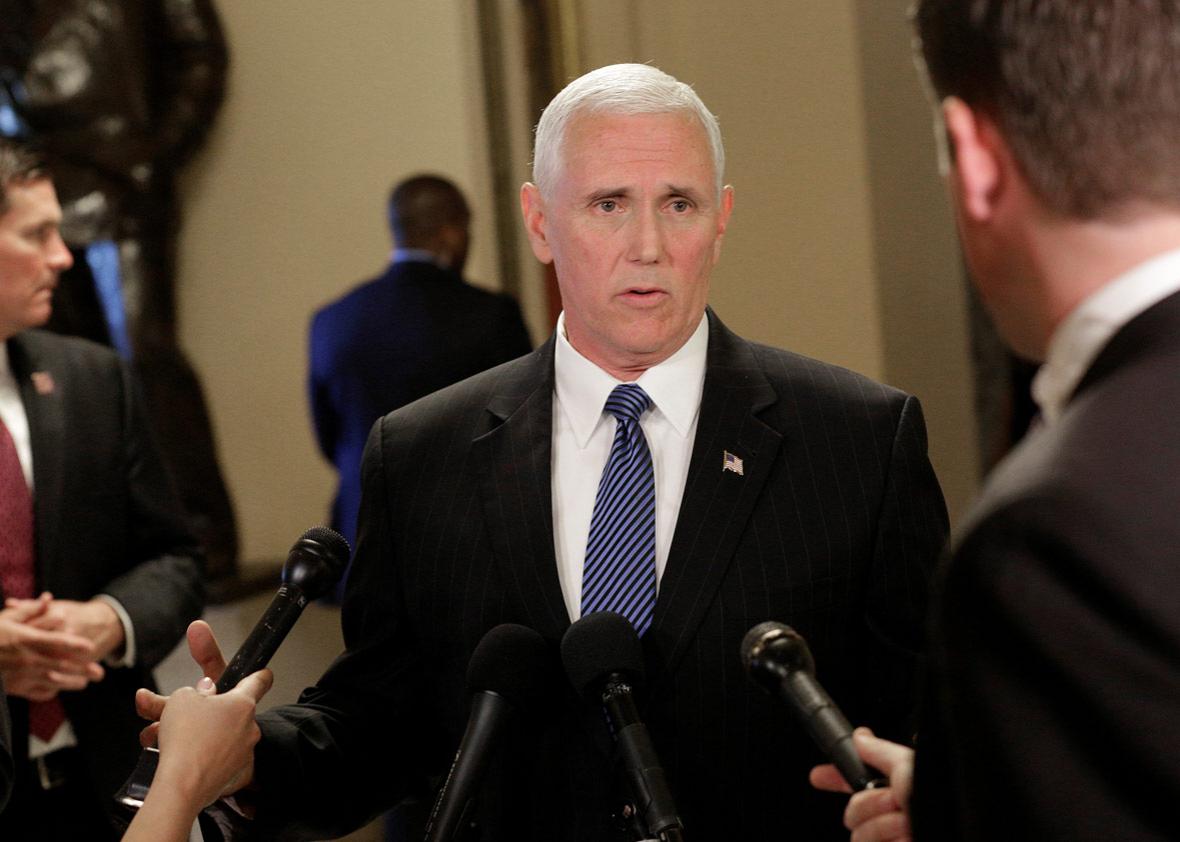The odds of Donald Trump leaving office before the end of his term are still incredibly low. But that hasn’t stopped some Republicans from thinking about—and perhaps pining for—Vice President Mike Pence to replace him, and urging their compatriots to think similarly. “Republicans who are reflexing defending the self-inflicted wounds of this President have no need for him with Mike Pence in the wings,” wrote conservative pundit Erick Erickson, urging Republicans to either intervene with Trump or push for his ouster. Likewise, in a piece calling for the 25th Amendment option—removing Trump from office as too incapacitated to perform his duties—conservative New York Times columnist Ross Douthat argued this move would leave conservative governance in place, i.e., Republicans would still have Pence.
Politico quotes anonymous Republican lawmakers, aides, and lobbyists who all voice a preference for Pence over Trump. They see him as skilled, knowledgeable, and free from the “drama” of the present administration. As for Pence himself, while he’s been quiet the past two weeks—as the White House grapples with its latest scandals—he hasn’t been idle. This week, the vice president took the unusual step of launching a political action committee, called the Great America Committee, which will raise money for Republican congressional candidates. This is precisely what an ambitious politician might do if he were looking to the future, while it is also somewhat unprecedented for vice presidents.
Implicit in this chatter is the idea that Pence is untouched by the scandals of the Trump administration, and that he could float free of the recrimination and division that would come in the wake of resignation or removal. But this is a delusion. Not just because Pence has been a key enabler of the president—lending his stature to Trump when he was a newly minted nominee, defending his worst transgressions during the campaign, denying reality on the president’s behalf, etc.—but because Pence, an influential figure in the administration, is potentially implicated in its misdeeds.
On Wednesday, the New York Times broke news that Trump’s presidential transition team reportedly had full knowledge that Michael Flynn—who would go on to be the president’s first national security adviser—was under FBI investigation for secretly working as a paid lobbyist for the Turkish government. What makes this complicated for Pence is that he ran the Trump transition, and also told reporters—in the wake of Flynn’s removal earlier this year—that he had no knowledge of the lieutenant general’s ties to Turkey. Pence’s office maintains that this is the case. In a statement it says that the vice president “stands by his comments in March upon first hearing the news regarding General Flynn’s ties to Turkey” and that he “fully supports the President’s decision to ask for General Flynn’s resignation.”
But if the transition team knew about Flynn’s ties, this can only mean one of two things for Pence: That he is lying about the extent of his knowledge, that he was an irresponsible manager of the transition, or that he is deeply ignorant of goings-on in the administration. If events force Trump out of office, it’s not hard to imagine a scenario where pressure falls on Pence. What did he know? And when did he know it? What has been the nature of his involvement in Trump’s decisions, and was he aware of the president’s misconduct?
Pence would not be able to escape the pull of Trump’s scandals. But even if he could, there’s still the fact that a Trump departure—through resignation or removal—would completely fracture the Republican Party, laying bare the divisions that almost consumed it during the 2016 presidential election. Trump leaving would blow his makeshift coalition of working-class whites and traditional GOP voters apart, and supercharge the power struggle among congressional Republicans, between hard-right Tea Party Republicans and their more pragmatic or moderate counterparts. Republicans who didn’t face primary challenges from Trump-inspired candidates—or the full weight of pro-Trump conservative media—would have to deal with angry and dejected voters, unwilling to back a Republican Party that abandoned their president. And that is to say nothing of the fact that Trump would still be around, speaking, tweeting, and sowing chaos in the party he would have left behind.
Under the best-case scenario where Pence isn’t toppled by Trump’s scandals, he is still saddled with a broken, divided GOP; an unpopular agenda; and supercharged opposition, eager to go in for the political kill. And indeed, this goes beyond Pence. There is no clean slate for the Republican Party, no move it could take to distance itself from Trump, either now or in some future when he’s not in office. Trump is an unstable and dangerous presence in the Oval Office, and the GOP put him there, defending his actions and enabling his worst instincts.
Republicans may fantasize about a President Pence—about a world where they can pursue their aims without an FBI investigation, without wondering just when their dysfunction will plunge American politics into another round of farce—but the truth is that the die has been cast. The GOP is stuck with Trump, and his fate is theirs and thus ours.
